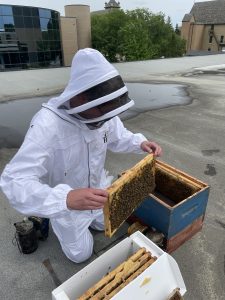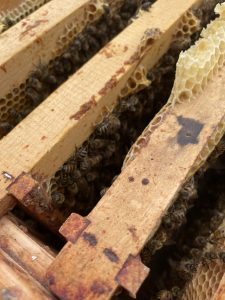Supporting bees

Moving the bees to their new home.
Bees are among the insects that help pollinate plants, making bees one of the essential links in our food chain.
We hope that the presence of a small number of hives at Brandon University will provide benefits to honeybee populations: Since 2006, when Colony Collapse Disorder was first reported, the plight of the declining honeybee has been a national and international crisis. Hosting hives at Brandon University will add to the number of hives in Manitoba, and will give honeybees a new area in which to forage. The biodiversity within the City of Brandon (from personal and community gardens), is also incredibly helpful to honeybees, giving them a plethora of different food sources.
Honeybees on campus will also bring benefits to pollination: A third of all crops require insect pollination, and bees are the most common pollinator. Honeybees at Brandon University will therefore help homeowners and community members who require pollination for their fruit, flower, and vegetable gardens. Since the beginning of the COVID-19 pandemic, people have been planting vegetable gardens in far greater numbers. Brandon University also has its own vegetable gardens (Green Futures BU and Incredible Edibles) that will benefit from consistent pollination.
Because of their role in pollination, honeybees benefit biodiversity: they encourage flower growth and development, aid in developing strong trees, and assist in fruit formation. The seeds and nuts developed on such trees and plants then provide food for a multitude of other creatures, and the trees and plants also offer shelter for insects, birds, and other animals.

Some of Brandon University’s bees hard at work.
The hives on campus will also benefit food security: One beehive can produce 100 pounds of honey each year. Some of the honey produced by the bees at Brandon University will be donated to the Brandon University Student’s Union food bank, and some will be available for sale.
Hosting honeybees at Brandon University will help to raise awareness for the vital role of honeybees in pollination and biodiversity, and will also draw attention to the decline in global honeybee populations. Moreover, having hives at Brandon University will provide an educational opportunity for students, faculty, community members, and staff to see bee hives and to learn more about the benefits of urban beekeeping. Since the honeybees would be on campus in the spring and summer months, viewing the hives (from a distance) may also be an appropriate activity for Mini U, or for the participants of the Enviro Expo.
